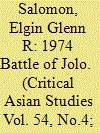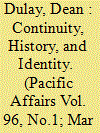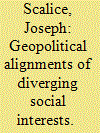|
|
|
Sort Order |
|
|
|
Items / Page
|
|
|
|
|
|
|
| Srl | Item |
| 1 |
ID:
188587


|
|
|
|
|
| Summary/Abstract |
Addressing the limitations of the dominant historiography of the Martial Law period (1972–1986) of the Philippines in Mindanao and the Sulu archipelago, this article provides testimonial narratives of witnesses and survivors of the 1974 Battle of Jolo as a counter-history. Tausug identity has been constructed and depicted by examining how the experiences of both Christian and Muslim Tausug shifted from cooperation to violence after this battle. The imposition of Martial Law and the 1974 Battle of Jolo not only caused displacement, property destruction, and casualties, it significantly contributed to the animosities between Christian and Muslim Tausugs that continue until the present.
|
|
|
|
|
|
|
|
|
|
|
|
|
|
|
|
| 2 |
ID:
189558


|
|
|
|
|
| Summary/Abstract |
In May of 2022, Bongbong Marcos won a commanding 59 percent of the vote to become president of the Philippines. His victory was, on some level, shocking to scholars and analysts of Philippine politics. As a result, a plethora of different theories have been proposed, in an attempt to explain why Marcos won. In this paper, we use nationally representative survey data to explore which factors predict (and do not predict) voting intention for Marcos. We find that, a) support for former President Rodrigo Duterte, b) positive perceptions of the late President Ferdinand Marcos and martial law, and c) ethnic (linguistic) identity are strong predictors of voting for Bongbong Marcos. On the other hand, age, education, and income are not. Consequently, theories based on continuity, coalition, history, and identity provide the most leverage on the question of why Bongbong Marcos won the election.
|
|
|
|
|
|
|
|
|
|
|
|
|
|
|
|
| 3 |
ID:
178627


|
|
|
|
|
| Summary/Abstract |
In April 1967, the Partido Komunista ng Pilipinas (PKP) broke in two. This article examines how a contradiction at the heart of the party’s program, which sought to retain leadership over both a mass movement and an alliance with a section of the elite, fragmented the party along the lines of the Sino-Soviet dispute. The ideological expression of the rival national interests of the Soviet Union and People’s Republic of China found congruent alignment with the diverging social forces in the PKP. The Soviet bureaucracy offered attractive terms of trade to countries of belated capitalist development. Sections of Filipino capitalists saw this as a means of developing national industry, and leading layers of the PKP allied themselves with the Marcos administration in support of these ends. In contrast, a cultural revolution and a protracted people’s war expressed the geopolitically imperiled position of China. University-based youth were drawn to this perspective. Over the course of 1966, the PKP was torn apart along the fault-lines of the Sino-Soviet ideological split, as this global dispute gave political form to the diverging social interests within the party.
|
|
|
|
|
|
|
|
|
|
|
|
|
|
|
|
|
|
|
|
|